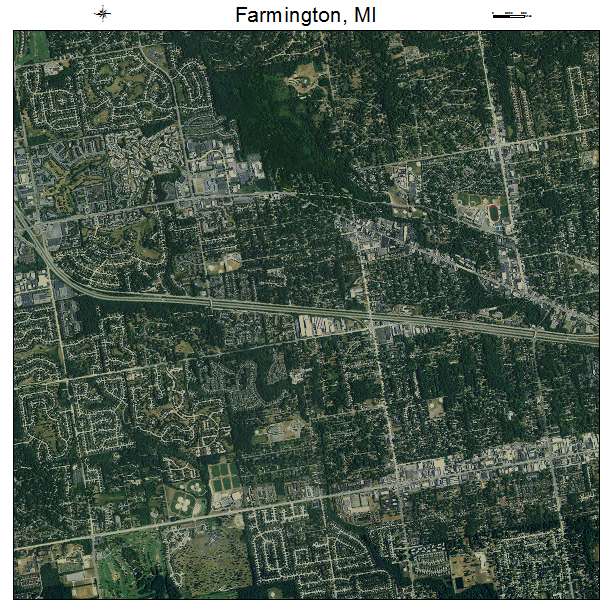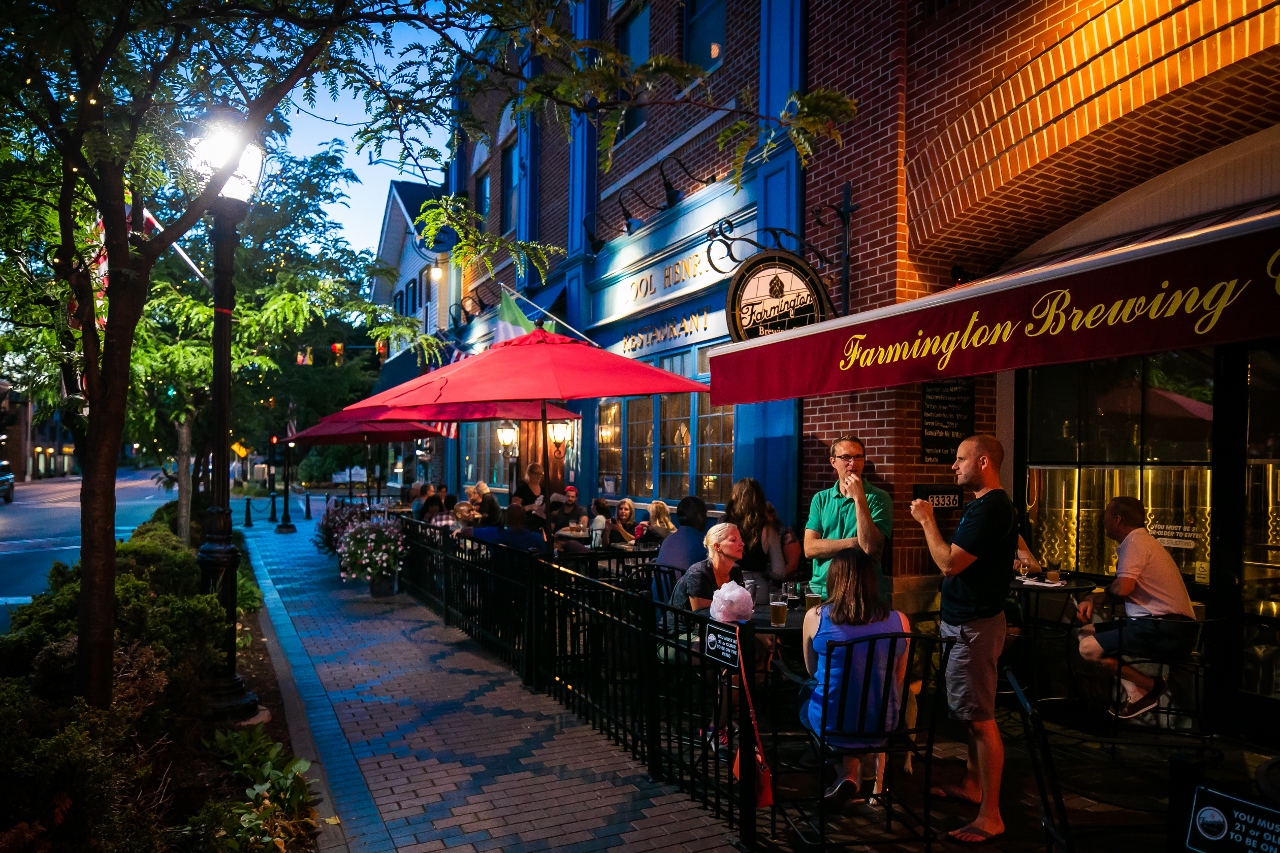Farmington, Michigan: A Geographic and Historical Overview
Related Articles: Farmington, Michigan: A Geographic and Historical Overview
Introduction
With enthusiasm, let’s navigate through the intriguing topic related to Farmington, Michigan: A Geographic and Historical Overview. Let’s weave interesting information and offer fresh perspectives to the readers.
Table of Content
Farmington, Michigan: A Geographic and Historical Overview

Farmington, Michigan, a vibrant city nestled in the heart of Oakland County, boasts a rich history and a thriving community. Its location, a blend of urban amenities and suburban tranquility, has played a pivotal role in its development and continues to attract residents and businesses alike. Understanding the geographic layout of Farmington is crucial for comprehending its past, present, and future.
A Historical Perspective
Farmington’s origins can be traced back to the mid-19th century when the region was primarily farmland. The city’s name, aptly reflecting its early agricultural roots, was officially adopted in 1835. The arrival of the Grand Trunk Railroad in the late 1800s significantly spurred growth and development, transforming Farmington from a rural settlement into a bustling center of commerce and industry.
Geographic Features
Farmington is situated in southeastern Michigan, approximately 20 miles northwest of Detroit. It is bordered by the cities of Livonia to the south, West Bloomfield Township to the west, and Farmington Hills to the east. The city’s geographic features are characterized by a gently rolling landscape, punctuated by numerous parks, lakes, and green spaces.
Key Landmarks and Points of Interest
Farmington’s map reveals a tapestry of historical landmarks, cultural attractions, and recreational opportunities. Some prominent locations include:
- Farmington Founders Park: This sprawling park, situated in the heart of the city, serves as a vibrant hub for community events, recreational activities, and historical preservation. It features a picturesque gazebo, a playground, and a walking path that winds through lush greenery.
- Farmington Historic District: This designated historic district encompasses a collection of beautifully preserved 19th-century buildings, offering a glimpse into the city’s rich architectural heritage.
- Farmington Public Library: A cornerstone of the community, the library provides residents with access to a vast collection of books, resources, and programs. Its modern facilities and welcoming atmosphere make it a popular destination for all ages.
- Farmington Hills Heritage Park: Situated just east of Farmington, this park offers a serene escape with its picturesque walking trails, scenic ponds, and preserved natural habitats.
Transportation and Infrastructure
Farmington’s strategic location and well-developed transportation network contribute significantly to its accessibility and connectivity. The city is conveniently served by major highways, including I-696 and I-96, providing easy access to other parts of Metro Detroit and beyond. The city also boasts a robust public transportation system, including the SMART bus service, connecting residents to various destinations within the region.
Economic Development and Business Growth
Farmington’s map reveals a thriving business community, with a diverse mix of industries contributing to the city’s economic vitality. The city’s strategic location, its skilled workforce, and its commitment to fostering business growth have attracted a range of companies, including those in the fields of technology, healthcare, and finance.
Community and Culture
Farmington is renowned for its strong sense of community and its vibrant cultural scene. The city hosts a plethora of events throughout the year, including the annual Farmington Founders Festival, which celebrates the city’s history and heritage. The city also boasts a thriving arts community, with numerous galleries, studios, and performance spaces.
Education and Recreation
Farmington is home to a highly-regarded public school system, with a strong emphasis on academic excellence and extracurricular activities. The city also offers numerous recreational opportunities, including parks, playgrounds, and sports fields, catering to residents of all ages and interests.
FAQs about Farmington, Michigan
Q: What is the population of Farmington, Michigan?
A: As of the 2020 census, the population of Farmington was approximately 10,700.
Q: What is the average home price in Farmington, Michigan?
A: The average home price in Farmington varies depending on the size and location of the property. However, it generally falls within the range of $300,000 to $600,000.
Q: What are some of the major employers in Farmington, Michigan?
A: Some of the major employers in Farmington include Beaumont Hospital, Oakland University, and various small businesses in the city’s commercial districts.
Q: What are some of the popular restaurants in Farmington, Michigan?
A: Farmington boasts a diverse culinary scene, with popular restaurants serving a wide range of cuisines, including American, Italian, and Mexican. Some notable options include The Farmington Inn, La Piazza, and El Burrito Loco.
Q: What are some of the best places to visit in Farmington, Michigan?
A: Farmington offers a variety of attractions, including the Farmington Founders Park, the Farmington Historic District, and the Farmington Public Library. The city also boasts several parks and green spaces, providing opportunities for outdoor recreation.
Tips for Visiting Farmington, Michigan
- Explore the Farmington Founders Park: This park is a great place to enjoy a picnic, take a walk, or attend a community event.
- Visit the Farmington Historic District: Take a stroll through this historic district and admire the beautifully preserved 19th-century buildings.
- Attend the Farmington Founders Festival: This annual festival celebrates the city’s history and heritage with live music, food vendors, and family-friendly activities.
- Dine at one of the many restaurants: Farmington offers a diverse culinary scene, with restaurants serving a wide range of cuisines.
- Explore the city’s parks and green spaces: Farmington boasts several parks and green spaces, providing opportunities for outdoor recreation.
Conclusion
Farmington, Michigan, is a thriving city with a rich history, a vibrant community, and a promising future. Its strategic location, its diverse economy, and its commitment to quality of life make it an attractive place to live, work, and visit. By understanding the city’s geographic layout, its key landmarks, and its cultural offerings, visitors and residents alike can gain a deeper appreciation for Farmington’s unique character and its place in the heart of Oakland County.








Closure
Thus, we hope this article has provided valuable insights into Farmington, Michigan: A Geographic and Historical Overview. We hope you find this article informative and beneficial. See you in our next article!